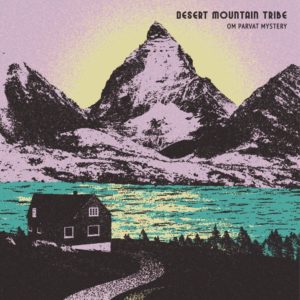Liverpool Sound and Vision Rating * * * *
Music must progress, to allow it to stand still is to ask that the rain must never fall, that the sun must forever shine only on the privileged and that winds of good fortune and ill favour must always be separated into those who some higher power decrees it be upon. Music must be bold, music must flow like rivers drift and curse into the wider seas and oceans, it must shift course and it must take hold of the listener in ways they never expected it to; it must always remain a mystery in which the dutiful audiophile must explore and always understand that it can never be truly understood.
In Desert Mountain Tribe’s second album, Om Parvat Mystery, the understanding is clearer than might be described by others, for the London based alternative rock trio have laid down a course which scales the heights of the enigmatic and the flirting with peaks and avoiding the troughs that befall so many when the audience clamours for more, when the interest is unavoidably exposed, vulnerable and sweepingly cool.
What the album also brings to the fore is an opportunity for the uninitiated to hear one of the finest voices in Namja Akhtar in two of the group’s songs, Himalaya and Chemical Genius; an occasion in which to savour, a prospect of illumination upon the highest musical summit, one that is employed with favour and prestige by Jonty Balls, Philip Hahn and Frank van der Ploeg.
Whether in the two aforementioned songs, or in the tracks Way Back To You, Wide Eyes and High Drive, Desert Mountain Tribe’s seemingly inexhaustible strength of character carries them through, the taste for the ethereal always hanging in the air, grasped for and longed over, one that makes Om Parvat Mystery ring loudly and with honour.
In any mystery there must be a hero who makes the connections; in Desert Mountain Tribe there are three, and each one a musical explorer and hero.
Desert Mountain Tribe release Om Parvat Mystery on June 1st.
Ian D. Hall
